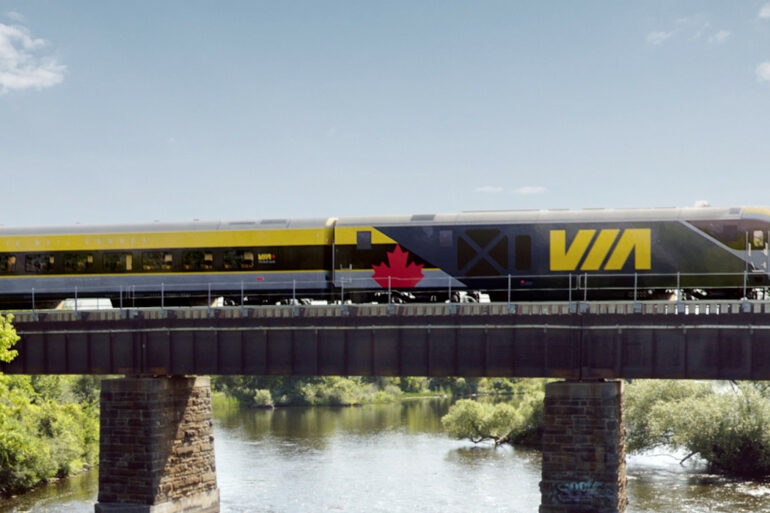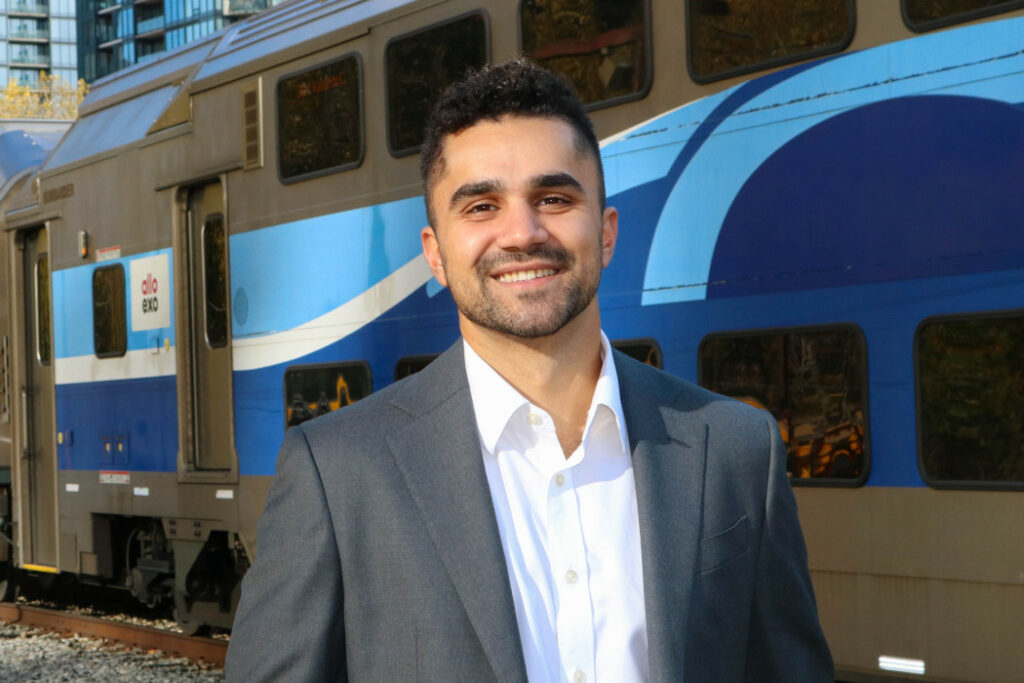RailVision Analytics has set out to help railway operators reduce diesel consumption—and by extension, train-related greenhouse gas (GHG) emissions—with its tablet-based app.
Despite the rail industry’s importance, RailVision founder and CEO Dev Jain believes many people have a “weak perception” of how it works given that so much of its operations take place “at night and out of sight.” Jain told BetaKit in an interview, “it’s an industry that things just show up on their doorstep and they have no clue how it got there, but it’s responsible for moving more or less everything around.”
Backed by transportation and cleantech VCs, RailVision is already helping railway firms like Metrolinx and Via Rail reduce their fuel costs.
Many trains run on diesel fuel, which produces GHGs. But according to RailVision’s CEO, there’s “a whole lot of variation” in the way that different people drive those trains, and that variation can prove costly, especially amid rising fuel costs.
“If you really modulate the way that you’re using your throttle, using your brakes, then you can save a whole lot of fuel and still arrive in the same amount of time,” Jain said, noting that less fuel burned equals less GHG emissions.
Jain’s Montréal-based train technology startup has been pilot testing an artificial intelligence (AI)-powered software solution called EcoRail that does just that with several major railway companies over the past year, including Metrolinx, Port of Montréal, Via Rail, and Genessee & Wyoming. In early demonstrations, the company has helped deliver cost savings of 10 to 15 percent.
After completing some successful pilots and filling up its tank with $5.5 million CAD ($4 million USD) in seed funding from a group of transportation and cleantech VC firms, RailVision plans to grow its team and expand its EcoRail product line and customer base.
RailVision’s all-equity round closed last month, led by Trucks Venture Capital with support from new investors MUUS Climate Partners, Blackhorn Ventures, Incie.org, and Measured Ventures, and follow-on participation from Active Impact Investments and Neil Murdoch. The capital brings RailVision’s total funding to over $6 million CAD.
RELATED: In Canadian first, Gatik and Loblaw take safety drivers out of autonomous delivery trucks
Given its size and environmental impact, the railway industry is ripe for an energy and tech overhaul. Many trains run on diesel, and in freight, diesel reportedly accounts for around two-thirds of total energy demand. Amid Russia’s invasion of Ukraine and a number of other factors, the cost of diesel fuel, which is tied to oil prices, has been increasing.
Electric trains are on the way, but the transition towards electrification will take time, and progress so far has been slow, especially in North America. As of 2018, less than two percent of United States (US) railways were electrified, according to EESI. North of the border, The Narwhal has reported that the earliest Ontario’s Go Transit—a division of RailVision customer Metrolinx—will disconnect from diesel is 2032 in light of political jostling.
As Trucks general partner Reilly Brennan told BetaKit in an interview, other startups in the space are working on “moonshot” solutions like full-battery electric trains and hyperloop tech. But as Brennan noted, while “radical replacement technologies for rail” are coming, they will also take more time.
“What is potentially more interesting today, and more profitable for founders and investors, are the things that allow ‘old assets’ to be made much more efficient,” said Brennan.
RailVision falls into this latter category. The startup’s tablet-based software, which has an interface that resembles Google Maps, taps into existing train fleet equipment data and uses AI to give conductors instructions on how to drive the train they are operating while consuming less fuel.
The startup initially set out to secure capital this summer amid a challenging fundraising environment for tech startups. Despite these conditions, Jain claimed the startup faced few headwinds closing this round. “We were trying to raise in the worst time of the year in the worst market conditions of the last few, but we really didn’t face many challenges,” said Jain.
The CEO attributed this to strong investor interest in climate, transportation, and supply chain tech. “These are spaces that don’t disappear just because the world is going through tough times,” added Jain.
Winterfield told BetaKit that the round attracted four competing term sheets from lead investors, which he said speaks to the “very strong traction” RailVision has achieved since the firm wrote its first cheque into the startup in Q3 2021.
RELATED: Active Impact Investments closes second fund, securing $54 million
“RailVision converted their pilot customers, Via Rail and Genesee & Wyoming, to recurring customers by delivering 15 percent fuel reductions without affecting travel time,” said Winterfield. “That’s significant cost savings and CO2 reduction that we’re confident they can replicate with new and existing customers.”
San Francisco-based Trucks focuses on tech startups that make transportation safer, decarbonized, and more accessible. As Brennan noted, RailVision checks all three of these boxes, joining a list of Canadian investments that include Toronto same-day delivery startup Swyft and autonomous trucking firm Gatik.
As Brennan noted, RailVision offers a particularly appealing path towards decarbonization because it also facilitates cost savings for railway operators. “The good thing about RailVision is that you get both,” he said.
“What is potentially more interesting today … are the things that allow ‘old assets’ to be made much more efficient.”
Brennan believes RailVision has a significant market opportunity in front of it, but the startup first needs to ensure its tech is “world-class” in Canada across different customer segments. As RailVision looks to expand, Brennan said the good news for the startup is that the rail community is “pretty tight knit” when it comes to new technologies, noting that the company has already had a lot of conversations with firms looking to deploy its solution.
While reducing fuel costs and emissions is RailVision’s “core focus,” the startup sees room to expand in rail to applications beyond just fuel. Jain described EcoRail as a “trojan horse product” that has helped RailVision get its foot in the door in the railway industry.
In this space, RailVision faces competition from more established players like US-based Wabtec and ProgressRail, a division of construction giant Caterpillar.
For his part, Jain noted that there are other more mature players in the sector that also have a hand in a lot of things in the railway industry in addition to just fuel management. “That’s really the opportunity for us as a startup,” said Jain. “To come in and address one thing that people care about a whole lot and really grow from there.”
Feature image courtesy Via Rail.



